JobDrive
This drive is all about the importance of choosing the right job that you enjoy.
A job or career that gives you options in the future. When we say career, it doesn’t mean a professional suited and booted role - it could be any job that suits your skills that you make money at. It could be a builder, nurse, electrician, financial advisor, software developer, social media influencer etc.
JobDrive looks at not only making the right choices of job but considers jobs that are flexible that may suit your lifestyle as you progress in life. We also look at changing careers at various intervals as your life expectations change. Looking at self-employment versus employed and turning hobbies into careers.
Parents and family and social situation play a part in choosing a career. Many young adults often follow parents/family into similar lines of work is that because they know more about the industry, background and longer-term effects or is it laziness or the safest option as making that first leap into work life is scary and fearful of the unknown.
Being in the wrong job can be one of the biggest frustrations in life. It can cause stress and anxiety. Especially in later life you need options, choices and the ability to change career direction. Often lack of education and life experience can reduce the option a person has. This can lead to frustration and a feeling of being trapped.
Financial or family commitments also play a role in career choices. We could at a young age be lucky and get a great job paying great money and we progress through stages - buy a house, get into debt, loans, credit cards, improved lifestyle, babies etc. The worry is that one day something happens and the income that supports all the trappings of life stops.
Click on a heading below and see a summary, and if you're interested you can GO and read more about it!
Here are some initial thoughts about jobs. GO!
Try and choose a job, career, vocation which fits with who you are. GO!
Your first job can be a nervous time – see some tips. GO!
There is a wide range of opportunities to look at.. GO!
How you feel about what you do affects how you see your working life. GO!
Should you follow your passion or take a more opportunistic approach? GO!
What are the key steps you should take to find the right job? GO!
How can you find out what sort of job suits you? GO!
Which would suit you better?? GO!
See the process suggested by Indeed. GO!
Where do you turn when things go wrong at work? GO!
What are the signs that you should consider changing your job? GO!
What steps should you take when it’s time for a change GO!
If you’re a visitor to our site you can join and download information, assess your own health and create your own action plans, and even contribute to our site. GO!
There are some ideas on next steps you can take. GO!
We have some additional information and stuff on this subject. GO!
Some Initial Thoughts
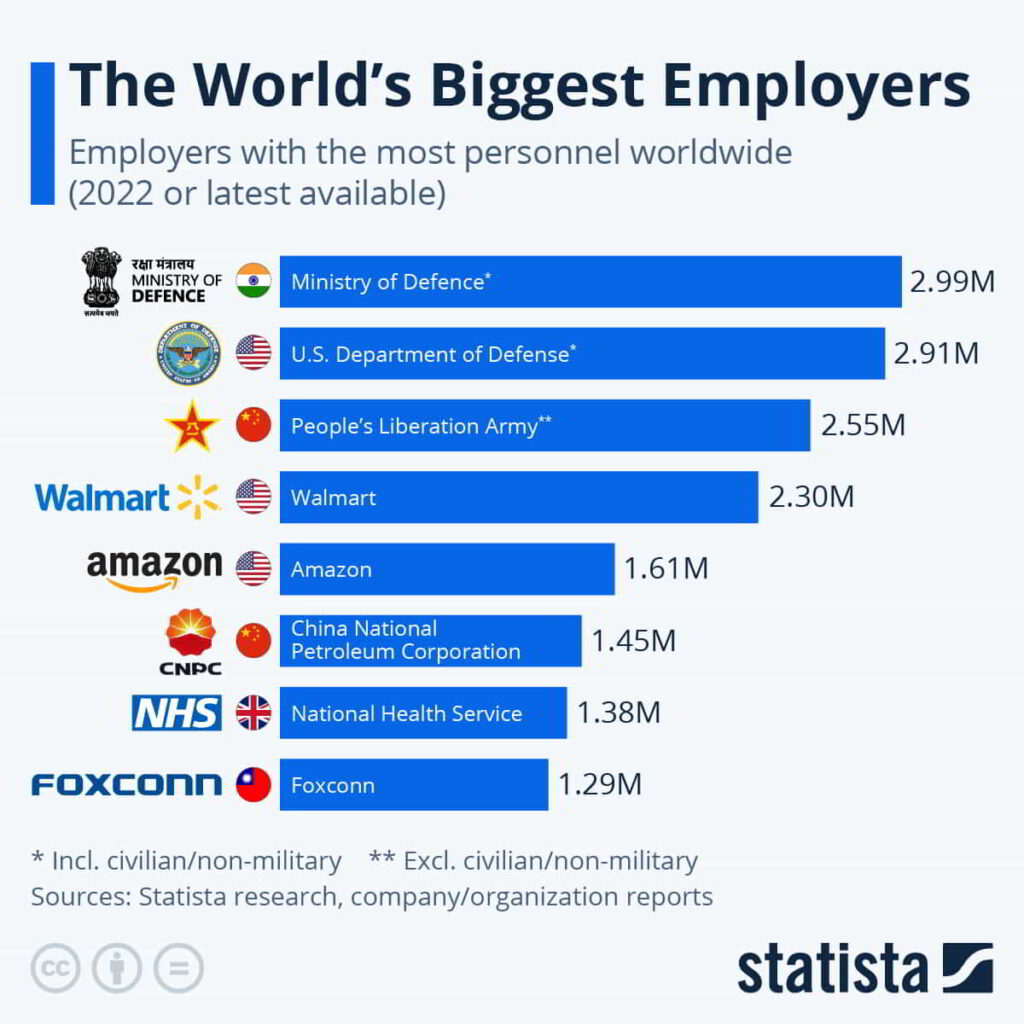
The World's Biggest Employers
The biggest company in the world is Walmart (2.3 million) - it employs even more people than Amazon.
However, there is one sector that employs more people than retail. It's defence. The world's biggest employer is India's Ministry of Defence with 2.99 million people - slightly more than the US equivalent with 2.91 million. Although the Chinese equivalent (Central Military Commission may have 6.8 million people - the figure wasn't regarded as reliable enough to include here. Source Statista
Interesting that the NHS for the UK is in the list - it is clear that despite the huge scale of its employees, there aren't enough people to meet demand. About half the staff are professionally qualified clinical staff. You can see a report from the Nuffield Trust here.

Right education, right choice, right career
Having the right education and life skills helps get the right career.
Lots of our time is spent either at work, traveling to and from work, or thinking about work so, it inevitably plays a huge part in our lives. If you are bored or unsatisfied with your job, it can take a serious toll on your physical and mental health. You may feel anxious and frustrated, depressed, or unable to enjoy time at home knowing that another day at work lies ahead.
Facts About Jobs
in the UK – Public sector £27,389. Private £30,973 (Indeed).
25% is the amount the UK freelance economy has grown by since 2009 – people are choosing to be their own boss and decide how they want to live their lives. (IPSE)
7 TIMES The average person will change careers 5-7 times during their working life according to Career Change Statistics.
Public sector are union members in comparison to 12.9 private ONS
Private sector sick rate is 1.8% and 2.8% for the public sector
In 2020 union membership was 23% this has dropped each year since 1995 32%
Typical sick rate in the NHS is 4.1% – this is 56,000 people each week
47% of the 1,000 individuals surveyed by London Business School wanted to change their careers. (London Business School)

Choose a vocation or career that suits not just your academic skills but your personality, character and desires
When we are choosing a career, most people never think about what the job will be like when they are half way through their lives. Many do not consider their personality and character as part if the career. Many young adults chose a job or career without thinking about; the money, the hours, the career progression, how high can I go, flexible working etc. They enter the workplace and after 2 years hate going to work, working shifts taking orders from someone they perceive as a dickhead and having to bite your tongue and accept it. If that person had sat down with their parents and said let’s look at all of the above things and see If I am likely to love this job for a long time.
I want to be a lawyer she says. Sounds so sexy, but is it. Extreme deadlines, locked in a room for days with 0000s of pages of documents to study, not set hours and total focus required. Stressful deadlines and counter deadlines, working unsociable hours and accuracy to detail is critical. Therefore, the role sounds amazing but she has a very short attention span, gets nervous with deadlines and hates working under pressure. It’s not a job she will enjoy. These types of decisions need parents and young adults to discuss to make sure she makes the right choice. 20,000 students pass a law degree every year but there are only 1500 openings across the UK, so what does she do as a backup?
When thinking of a career we often do not think of our own preferences. We can sometimes look at our family tree and parents to gauge what type of character are they. Do I want to spend my whole life working 9-5 in this job with 30 days holiday a year? I need a career that I like but if I decide to change careers or move country all is not lost my skills are transferable.
I hate taking orders from people and I want to be self-employed. If a person makes a successful career on a market stall selling bric a brac it’s a success if they are happy and its rewarding, as opposed to being a zombie standing on the platform of the train station going to the same job you’ve hated for 10 years.

Your first workplace
Being an adult is harder than you think and your parents often made it look easy. People often say when they get to 40 ‘I look back and thought my parents had an easy life, they just made it look easy, when in actual fact working fulltime in a career and bringing up a family is tough. Just leaving home and doing everything for yourself and in some instances living with another person can be overwhelming.
Your first work placement can be very stressful for many young adults get overwhelmed with the whole thing and get anxious and depressed. The workplace can be as cruel as the school playground so be warned.
Wrapped in cotton wool
This is the crunch time when parent find out how well they did bring their child into this world and how they schooled them for the future. Society has also a role to play here and If schools also fostered the cotton wool protection philosophy, then even bigger problems occur. The hard school of knocks where children learn to stand up for themselves and learn that sticks and stones may will break my bones but calling names won’t hurt me.
Many young adults who have never experienced work life before get a shock and those sensitive characters go into meltdown unable to cope with the harsh reality of adult hood.
Many turn to their doctor for help. Many doctors will give you medication rather than truly find out why you feel the way you do. There are many internet-based support organisation you can talk to instead of taking additive medication. The reality is medication does not solve the problem it just subdues your real feelings. There is such a thing as CBT (Cognitive Behavioural Therapy) courses which you can attend. But as a first step talk to your family and friends about how you feel. You will find for sure you are not the first or only one. Everyone has experienced it as some stage in their lives.
As a new adult you may have never been prepared for life as an adult or as we discussed previously you may not have a high level of emotional intelligence. Some teenagers are ready emotionally to enter the work place and leave home and become independent but many are not. There is nothing negative about this, as people mature at different stages and rates. It could be said many parents neglect this part of the training and think their children just grow into an adult and can cope. Many parents have positively prepared their teenagers with adult training and support and helped them to deal with the often-hard world of adulthood and work / life.
But many parents haven’t done their kids any favours and have negatively shielded their teenagers (sometimes inadvertently and not deliberately) from the rigours of adult life. There is an increasing group of pre- and post-millennial young adults who have gone to the doctors suffering from depression and anxiety. Statistics show that the number of pre and post Millennials young adults visiting the doctor for anxiety and stress has gone up by 30% in the last five years.
Parents need to recognise that they may have brought their children up to want for nothing and promised them the earth, not realising that many teenagers retain that desire as adults and find out that life can be pretty tough standing on their own two feet.

Fantasy land or real-life - careers today are even more varied
In this new world of work and celebrity, get rich culture, the opportunities are immense. Who would have thought 15 years ago someone could earn half a million pounds by sitting in their bedroom influencing others on the internet?
No matter what career a person chooses, parents need to always be around to chat through someone’ career moves and options; harnessing the power of more brains especially ones that don’t share your vision or come from a different generation.

Is it a job, a career or a calling?
This is aimed at everyone considering looking for a job or career in the UK, whether still at school, a student or people already working.Why do we talk about jobs and careers? Are they different? What if you REALLY feel you need to be a ......?
How can you look at these? If it’s a job you probably can’t wait to pack up each day, get paid at the end of the week and get on with the joy of living your life. If it’s a career then you’ll be aiming to climb the ladders of opportunity, promotion and power to be seen as important.. But if it’s a calling then it will bring you a sense of fulfillment because you believe your efforts are helping to make the world a little better.
Click on any of the tabs on the right to see more information
Dr Bryan Dik does a TEDx Talks video called ”How to Find and Live Your Calling” which describes by a real example what a calling is.
In this video it mentions a book called “What Colour Is Your Parachute?”, which we can recommend.
Jeff Bezos, founder of Amazon, provided 11 tips as career advice for young people. Here they are, courtesy of 1000 years of career advice.
- If you can figure out what you love to do, your day will be so fun. You will work with like minded energised people and your work will be so fun.
- “You can have a job, or you can have a career, or you can have a calling,” he says.“And if you can somehow figure out how to have a calling, you have hit the jackpot, cause that’s the big deal.”
- Failure is a necessary evil if you want to succeed. “We take risks all the time, we talk about failure. We need big failures in order to move the needle. If we don’t, we’re not swinging enough. You really should be swinging hard, and you will fail, but that’s okay.”
- “The most important thing is to be customer-obsessed,” he said. “Don’t satisfy them, absolutely delight them.”
- Building a culture of high standards is well worth the effort, and there are many benefits. Naturally and most obviously, you’re going to build better products and services for customers – this would be reason enough! Perhaps a little less obvious: people are drawn to high standards – they help with recruiting and retention,”
- Be willing to embrace change as that can be your competitive advantage. “I observe people who are right a lot and have detected some patterns. People who are right a lot, they listen a lot. They also change their mind a lot which is very interesting.”
- Don’t necessarily listen to your customer. “No customer was asking for Echo,” Bezos wrote in his annual letter to shareholders. “Market research doesn’t help. If you had gone to a customer in 2013 and said, ‘Would you like a black, always-on cylinder in your kitchen about the size of a Pringles can that you can talk to and ask questions, that also turns on your lights and plays music?’ I guarantee you they’d have looked at you strangely and said, ‘No, thank you.’”.
- Many people think about what is going to change in 10, 20, 30 years and think about products and companies around those ideas. Ask yourself ‘What is not going to change?’ What customer needs will be stable over the next 10 years and focus your energy there.’
- “High standards are contagious,” Bezos contends. “Bring a new person onto a high standards team and they will quickly adapt.”
- What you don’t necessarily need is skill, especially if you are part of a team. “The football coach doesn’t need to be able to throw, and a film director doesn’t need to be able to act,” he says. “But they both do need to recognize high standards for those things and teach realistic expectations on scope.”
- “You are going to be misunderstood. If you are doing anything interesting in the world, you are going to have critics”
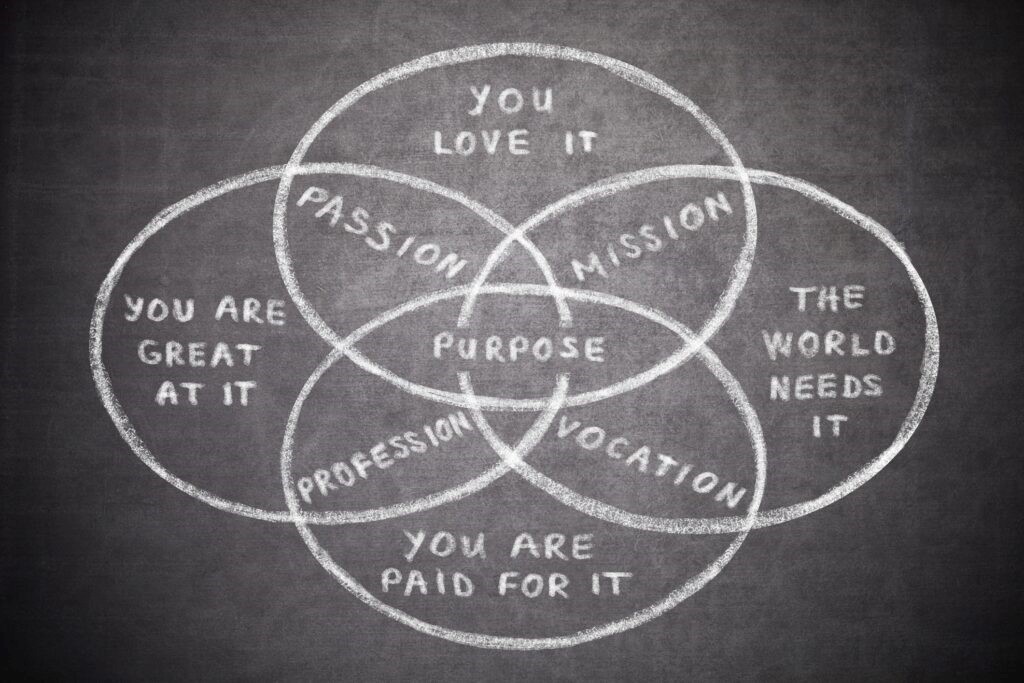
Should you follow your passion or be more opportunistic??
You might hear: “Follow your passion, and you’ll never work a day in your life.”
It's said: When you follow your passion in life, you're happier overall. You're more sated with yourself and the decisions that you make, and not weighed down by the common stressors that come along with not doing what you love. Overall, you feel more uplifted and have a far greater piece of mind.
The opposing view is: It gives the false impression that passions are simply side hobbies. Something you can't bring to a work place if you want to succeed. That going with “the flow” is the best chance at a sustainable life. Don't follow your passion, follow your opportunity.
See more on both points of view by clicking the tabs below.
Click on any of the tabs on the right to see more information
When choosing a career it is important to remember one key fact: people who enjoy what they do spend more time doing it, relish learning new things and their minds are positive and open to change. They are satisfied and worry less and suffer with less stress.
So when choosing a career you need to match your character, attitude, personality, and competence. If you’re unsure of your type, you can take a 5 minute personality test from Career Test UK based on the Briggs Meyer test which suggests work areas to suit your personality.
However, it’s easy to get all romantic about becoming a doctor or a lawyer but with any choice there are a number of negatives that need to be considered – in these cases years of study.
If you find after a few years your attitude has changed or the industry or role has changed and you become unhappy remember you need to start the process all over again.
Many people work solely for money and dread Mondays, being desperate for Friday to come. These days we are going to work for 45 years which is a long time to be miserable or do a job just for the money.
We can’t all be lucky if that’s what it is to have a job we love. Whilst we might not be an actor earning millions for playing parts in films we can be happy in our day to day activity and if we can earn a good living as well then that’s a win win situation.
In fact, the link between earnings and happiness is tenuous, as our post based on an article from the Financial Times shows.
They say the grass is always greener on the other side. We often look at others who may have a prolific career and think wow I wish I was them. But are they really happy? The press is full of reports of actors and pop singers who come off the rails and destroy their own lives.
One important fact is never decide to change career when you had a hard day or argument at work as you’re not thinking clearly or positively enough. You need a clear head and thought process when starting a new career plan.
Things might be very different this time as you may have family responsibilities or commitments and they must be factored into any decision making process. For sure your initial career decision can change as you go along.
Humans never stop learning and as we get older we learn not only about ourselves but also about our preferences. We may get into our 40s and find ourselves totally changing our preferences and desires having finally become consciously competent and aware of ourselves. From stockbroker to dairy farmer etc.
But that statement isn’t right. It assumes you have one passion and you understand fully what it is. In fact, people have a lot of different things they enjoy doing and learning about, these change over time and people never seem to know what will make them happy in future.
Another problem with the “Follow your passion” idea is that you only need to look inward. That makes no sense – if your passion is to be an astronaut it’s relevant to know that there have been fewer than 600 trained astronauts in history (more than 18,000 people recently applied for only 14 new astronaut openings). Being ambitious is one thing, but being wildly unrealistic is another.
When you’ve got a good idea what broad area you want to work in, sometimes it pays to see what jobs there are in that area.
Knowing whether opportunities are readily available in a particular area is relevant information. Some would even say that you should first focus outward on the available opportunities rather than focusing initially on what you think you want to do.
US TV presenter Mike Rowe said: “The people I’ve met on my journeys, by and large, didn’t set out to realise their dream. They looked around for an opportunity. They identified the opportunity. They exploited the opportunity. They worked at the opportunity. Then they got good at the opportunity. Then they figured out how to love it.”
To see what opportunities exist, you can look at the overall UK Labour Market statistics or overall employment by type
You can also look at LinkedIn, which is a professional social networking site which offers ways to look at people’s career paths by breaking down the connections between their majors, schools and careers. You can also meet people in the right field – often it’s about who you know as much as what you know!
Having found an opportunity – go for it! Use your network, and if that isn’t relevant, extend it by finding the right people. Consider taking on a related role to get closer, possibly part time, work experience or at a lower level, to get known. There’s nothing more realistic than actually doing the work you’re thinking about dedicating your life to!

What are the key steps you need to take?
There are some fundamental things you need to consider when thinking about a career or changing a career. Over the years your views, emotions, expectations and life experience can change your views as you journey through life.
It takes Time; When considering a career or job it takes time and lots of thought and consultation with others. You don’t need to take other people’s advice but you do need to consult to get a broader view or understanding of options. So, consult with family, friends, colleagues and specialists. Gather all the facts before narrowing down your options. You then need to think of plan B which is; what if you don’t like your choice of work after 12 -24 months what do you do then.
What am I looking for?
In order to make an informed decision on your direction, you need to do some thinking first. You need to:
Click on any of the tabs on the right to see more information
- Determine Your Goals
What do you want out of a career? There are options:
- Do you want to help other people?
- Do you want to travel?
- How much money do you want to make?
- Do you want to work for others
- Stability verses change
- Corporate versus public sector
You also need to separate YOUR goals from the goals others have for you – while getting advice is good you need to drive your choice by your wishes.
- Understand your values; think what you value in a job:
- Do you love working independently, or do you need social interaction throughout the day to feel fulfilled?
- Is it important for you to spend time with your family and be home at a certain hour every day?
- Or are you fine with working overtime and having a more unpredictable schedule?
- Who are you (really)?
The things you do in your free time can give you insight into the careers that would be satisfying, fulfilling and fun. To figure out your interests, ask yourself:
- What do I enjoy doing to relax?
- Do I prefer spending time indoors or outdoors?
Do I enjoy working with people, animals, data or books?
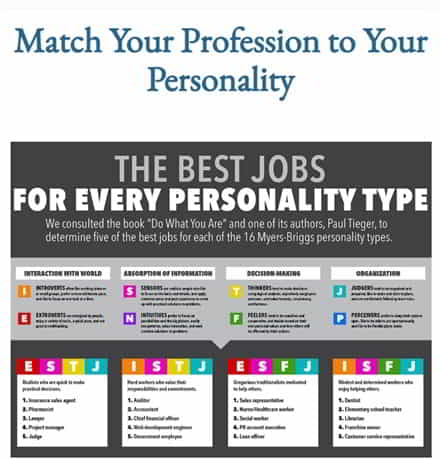
What’s your personality or character like and is there a career to suit?
Your personality is the way you think, feel and behave. You should consider several aspects of your personality.
• Are you typically a leader or follower?
• Do you prefer to work alone or in a group?
• Do you naturally cooperate or compete with others?
• Do you naturally help others or do you prefer to empower them to do things themselves?
• Are you a thinker (focuses on ideas) or are you a doer (takes action first)?
• Are you a creative and artistic person or do you prefer structure and routine?
These are generic traits. You can analyse your personality further using tests.
What’s your personality type?
People tend to believe that each individual is different and unique in their own way. While that may be true to an extent, it’s not entirely accurate. You can find out much more about your personality in PersonalityDrive.
It’s certainly not helpful when firms are trying to recruit people ‘of a certain type’.
When it comes to personality types, there are tests that categorise people into one of a few groups that describe their characteristics.
The best known is the Myers-Briggs test (MBTI), which scores people on four different axes, giving 16 different types of person.
You can do a personality test based on Meyers Briggs here.
These axes and their characteristics are :
extroversion (E) / introversion (I)
sensing (S) / intuition (N)
thinking (T) / feeling(F)
judging (J) /perceiving (P)
So each person has a 4 letter type. You can find out what type of person you are by taking a free test here.
Then note your score and you can see what types of job best fit that type by looking at a careerblog or Indeed.
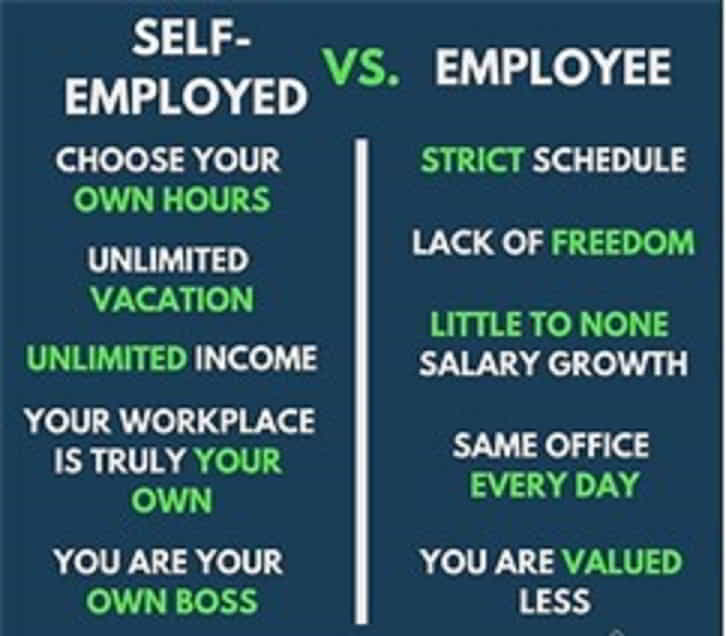
Self-employed or employed
When you’re self-employed you’re your own boss and don’t have to take orders from anyone. You can be self employed as a sole trader or you can set up a limited company. See 3. below for a description of both.
However, there are some things to think about if you’re thinking of going self-employed.
.
It takes time; When considering a career or job it takes time and lots of thought and consultation with others. You don’t need to take other people’s advice but you do need to consult to get a broader view or understanding of options. So, consult with family, friends, colleagues and specialists. Gather all the facts before narrowing down your options. You then need to think of plan B which is; what if you don’t like your choice of work after 12 -24 months what do you do then.
What am I looking for?
In order to make an informed decision on your direction, you need to do some thinking first. You need to:
Click on any of the tabs on the right to see more information
Some things to think about before you choose:
Are you currently employed?
Stay where you are
- Hopefully you have job security
- You have a guaranteed income every month
Look for another job
- May get more money
- Progression limited?
Go self employed
- You might be stuck with no progression
- You might earn more on your own
If you’re not currently employed
Go self employed
- You’ll have a limited income – especially in the early days
- There may be no working routine, colleagues (or office!)
- A gap looks bad on your CV
Look for a short term contract
- Will generate some money
Look for an employed position
- You can use your free time to learn new skills
- And apply for new roles
What Are the Company’s Values?
Choose a company that has similar values to you. If you’re someone who values religion, will your job let you off on Sundays to attend your religious services?
You want to choose a company that you can be proud of, one who has similar beliefs, and one who will honour yours. If not, you might end up hating your company in the long run because of how vastly different their values are.
What Is the Company Culture Like?
Choosing a career path means looking at what daily life inside a company is like. If you’re someone who wants to do more than sit in a cubicle, you need to consider that. Many companies have websites that show all they have to offer.
Look and see if employees have voted it a top workplace. Check and see if they do things for employees like company outings, volunteer opportunities, growth and more.
Have You Heard Good Things About the Company?
One easy way to get an inside glimpse of what life is like inside a company is by asking someone who works there. See if your friends have job openings that they recommend.
They’ll be able to give you an honest opinion on whether or not they think it will be a good fit for you. That’s because they know you and they know the company. Do research online and see if there are reviews out there. Pick something where people are excited to come to work each day.
What Benefits Do They Offer?
Picking a career is more than just following your heart. You need to look at what the position’s benefits are.
If you’re planning on having a child, what is the maternity or paternity leave like?
Do you get paid time off?
How do sick days work?
Is health insurance offered?
Is There Room for Growth?
One of the first things people look at is how much money does the job offer. If the starting rate is lower than you hoped for, don’t fret. You need to see if there is room for growth. Will you make more the longer that you’re there? Will there be promotions offered?
What’s Your Plan?
How long do you see yourself being with this company? Is it a short-term move, or do you want to stay longer?
If you know it’s short term, you need to use the time you’re there to plan your next move. If you’d like to stay but you’re worried you might have to leave, ditto.
Can You See Yourself Doing This Long Term?
Most people consider a career to be a long-term commitment. If you want to settle down and figure out what you’re planning on doing with your life, do your research. You want to find a career where companies value their long-term employees. Is this a company that you will be happy with in the long run? Is there room for growth? Do you get added benefits the longer you’re there?
Sole Trader or Limited Company
You can be your own boss in two main ways – become a sole trader (often referred to as self-employed), or start your own limited company.
Sole Trader
It is easier to set up as sole trader – you just have to let HMR know – this is the link.
Self-employed people do not pay PAYE tax – just do a self-assessment tax return once a year, but they also don’t have the same employment rights as employed people – they only have rights for their health and safety and also some rights against discrimination, and their rights are set out in the contract with their client.
There is no separation between business assets and liabilities and personal ones, so if anything goes wrong you are personally responsible.
Limited Company
The company is regarded as a separate entity to you, so as long as nothing illegal has happened your liability is limited to the (normally small) amount you paid for the shares in the company.
There is more admin involved – you need to register the company with Companies House and do annual accounts which have to be filed at Companies House. You also need to tell Companies House about the set up and shareholdings of your company annually. See here for government advice on setting up a limited company.
Basically, self-employed people run their own businesses. You can check whether you or someone else is self-employed online here.
If you are considering going self-employed, then there are some things you need to consider.
Costs
Some costs are inevitable – you will need:
• a business bank account – you can often get a free year
• premises – you may need an office or shop premises, and you can see some options here
• equipment / stock – you may need computers, stock to sell
• insurance – you will need business liability insurance
• an accountant – this will free up your time and make sure you do the formal things you’ll need to
• staff – you may need to take people on to help – be careful, as you’ll to pay their national insurance and wages and other benefits – don’t take on staff until you’re sure you’ll generate revenue to pay for them
Savings
You can use your own money to fund your business – advantages are that you don’t pay interest and you’re not beholden to external investors or lenders, but you might eat into your emergency fund and it might not be easy to get your money back out of the business.
Other means
You’ll need to do a business plan to get funding from banks – where you can use a current account overdraft, a business credit card or a business loan – or external investors.
How do you pay tax?
You have to do your own tax return, and you need to make sure you pay on time, as you’ll get fined from £100 to £1,600 if you don’t!
What happens if your business fails?
This depends – if you run your business as a limited company then you can liquidate it – this doesn’t affect you personally but it will affect you starting another business in the future. If you run your business as a sole trader, you might need to declare yourself bankrupt. See DebtDrive for more details.
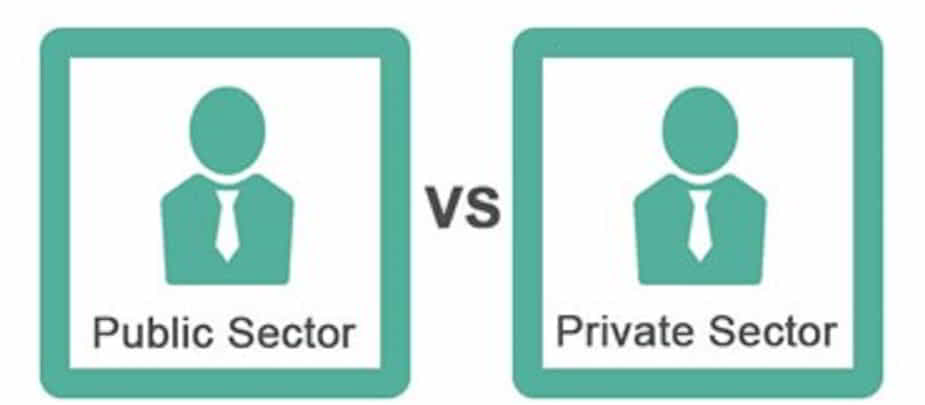
Employed - Corporate or Public Sector
Is there a difference between the two areas, 30 years ago very much so but today it’s beginning to merge a little but the attitudes and mentality haven’t changed. .
Investopedia describe the types of company as: 'The private sector is the part of the economy that is run by individuals and companies for profit and is not state controlled. Therefore, it encompasses all for-profit businesses that are not owned or operated by the government. Companies and corporations that are government run are part of what is known as the public sector, while charities and other nonprofit organizations are part of the voluntary sector.'
Click on any of the tabs on the right to see more information
If you choose a life in the corporate world, you are entering a moving target, a change organisation with many dynamic parts. Its usually attached to a market that moves and changes and cost and profit are measured regularly. There are no guarantees or job security even for people successful. The board of Directors are often, in the main made up of highly educated people who swim in a certain circle or group. There are good and bad corporates but truly you are there to do a job. If you are successful and are worth something to the corporate you will be fine.
Bad corporates have the usually issues of nepotism, mates get the best jobs. Corporate yes men nearly always do well. People are promoted to the height of their incompetence but good people can grow and develop and initiative are in the main encouraged. There are unions [ 12.9% union members] but their influence is less effective in large corporates and many paid union officials are more interested in their own role.
Culture is different every corporate but its generally about getting the job done. Leave you soul at reception as the company owns it and consider yourself grateful, we are employing you. But the company will go to extraordinary lengths to win investor in people, employer of the year awards and support local children hospices because it ticks all the corporate boxes. The reality is they are running a business.
Perks are reasonable and the higher up you go the better it gets. Most offer pensions with your contributions but the business comes first. Corporates do offer many governments initiative such as job sharing and alternative job roles, reduced working hours etc but it’s all budgeted.
Redundancies are common place in the corporate world with 38% [CIPD 2020 report] potential redundancies. In the public sector it is 16%.
Corporates are good at Change in the main and do foster best practice. Models such as Mc Donald’s demonstrates a worldwide [franchised brand] can have consistency across the globe and be successful.
If your personality does not suit this type of corporate culture then you are best looking for an industry that suits. What you often find in Corporates is you either stay for years because you don’t mind it or you quickly leave.
The public sector has changed over the years in terms of tighter budgets, operations and procedures but mentality, culture and attitudes haven’t changed. There is the odd best practice public sector business that leads the way but these are far and few between.
It can’t be said it’s a job for life any more as it used to be but it’s still near as damn it if you keep your head down and get on with your job.
Public sector often goes through the motions of project development but then someone else comes along and changes everything.
Nepotism still exists in many places with whole families employed forever. They are becoming more corporate but mentality wise it’s often ‘Don’t do anything above your pay grade. Don’t attempt to rock the boat with new ideas. Participate in projects just to say you’ve attended but nothing will change.’
Senior management are often brought in from outside so this stifles desire by lower ranks. They are fiercely protective of their roles and resent criticism; they feel they are employed by the government as servants of the people but customer service and care doesn’t run through them like a stick of Blackpool rock.
Pay is climbing to corporate levels and the pension schemes tend to be brilliant.
They are brilliant at capitalising on all government initiatives regardless of cost and maximise those benefits.
Bright sparks in the public sector are fiercely protective of their territory and ensure they remain in senior roles.
The public sector has a strong union presence [52% of employees are union members] and you have to do something seriously wrong to get the sack they usually put you on other duties.
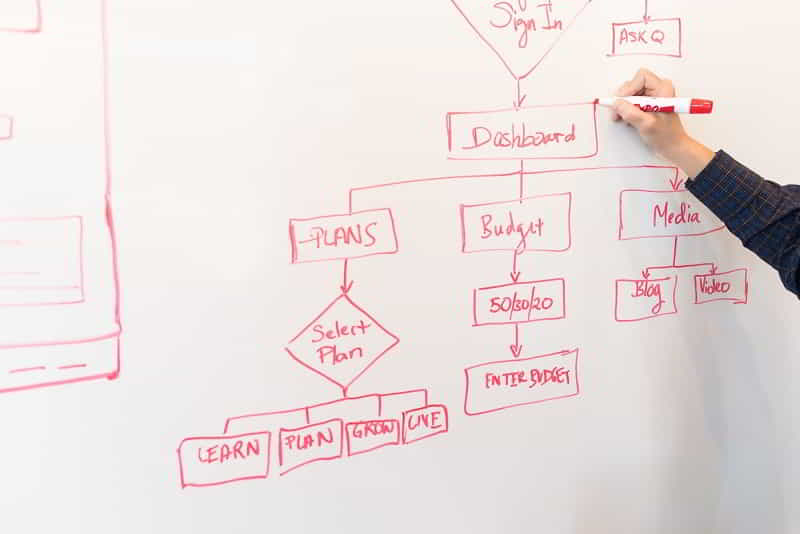
Is there a process I can follow to help me decide?
The job site indeed.com have a process they suggest you can follow to make your decision.
How To Choose a Career
This process comprises 7 steps, which need to be done in order. To see each step, click on the heading in the accordion below.
Before making any important decision, it’s a good idea to take time for self-reflection. Choosing a career is no different. In this step, you’ll reflect on what kind of work environment you want to be in, what type of work you enjoy, who you want to work with, and more.
As you’re reflecting, you may want to write down your notes. These can be helpful references as you’re evaluating job descriptions later on.
Here are a few questions to get you started. Try not to dwell on the questions but rather, write down the first thoughts that come to mind. If you’re not sure of some answers, trusted friends or family may be able to give guidance.
Self-assessment questions to consider:
What are your key values?
Example answers: Financial stability, helping others, independence
What soft skills do you possess?
Example answers: Time management, communication, confidence, problem-solving
What technical skills do you possess?
Example answers: Data analytics, planning, research, multilingual, photography
What natural aptitudes do you have?
Example answers: Writing, leadership, selling, project management, communicating, planning, technical problem-solving
What’s your personality like?
Example answers: Myers-Briggs (MBTI) personality type, quiet, outgoing, confident, aggressive, loyal
What are you interested in?
Example answers: Technology, writing, medicine, design
2. Identify your must-haves
Next, take some time to identify your must-haves in a job. These can range from anything like salary or travel to benefits and location. It might be helpful to return to the question-answer activity when recording what you can’t be flexible with when it comes to your career:
- Do you need to earn a certain salary?
- Do you require certain benefits like specific healthcare coverage or certain amount of time off?
- Could you take a job that involved travel?
- Do you need to work in a certain location?
- Do you require any sort of flexibility to work from home?
- Do you need to adhere to a specific job title or level?
- Are there certain tasks you need to or do not want to perform?
- Is there a certain work environment you cannot operate well in?
It is important to know what you need from a job ahead of time. For example, if you need to earn a consistent salary, you may want to avoid freelance work. Once you’ve determined your must-haves, you can use the research phase to determine jobs that might not work for you.
After understanding a bit more about yourself and your needs in a job, start looking for jobs that sound interesting or desirable to you. If there’s a job you don’t know much about, write it down and research it later. You may end up finding an interesting career path. Additionally, remember that job titles don’t always represent the actual job perfectly. While a title might not seem desirable, the job description might be a good fit for you. To start your list of jobs, here are some considerations:
Use your network. Do you know friends or colleagues with jobs that seem interesting? Tap into your network to explore jobs both they might hold, and jobs they think you may be interested in and/or good at.
Find interesting industries. Is there a particular industry that seems appealing? Are you naturally drawn to a particular category of work like design, fashion, business or education? Think about friends, family members or acquaintances who have compelling or attractive jobs.
Identify things you enjoy doing. Are there any activities or tasks that make time pass quickly? This can be anything from designing presentations to organizing information to working as part of a group. If you do enjoy designing presentations, for example, write down careers that might involve doing this work.
List your goals and values. Consider where you want to be in two, five and 10 years. Is there a particular title or level you want to achieve? Is there a location you want to be in or a certain lifestyle you want to have? Taking time to think about the future can help you identify jobs that will be a long-term fit.
Evaluate your strengths and talents. What are you good at? Whether you identify soft or hard skills, determining your strengths paired with things you enjoy can help you find a career that sets you up for success. If you’re good at organizing and interpreting data, you might write down jobs like data analyst, computer scientist or data scientist.
After you’ve explored jobs that seem interesting, start researching each one to create a short-list of serious career possibilities. The goal is to arrive at one or two career paths that you’re excited about. You can use the following steps as a guide for your research:
“Day in the life.” To get a better idea about whether a certain career might be a good fit for you, look into what the day-to-day of each job looks like. One way to get a bit more detailed information on jobs is by browsing career paths. Get example job descriptions and common tasks and responsibilities. You might also consider asking to shadow people in your network with jobs on your list.
Salary. Whether you have a specific salary requirement or not, it might be helpful to learn about average compensation for the jobs you’ve identified. Salary trends is a tool that let you see the trends in compensation for specific jobs in different locations. Enter a job title and you’ll see the salary range in various cities and with different employers.
Job requirements. Before choosing a career, you will need to know what certifications, degree, training or other credentials are required. You might decide that fulfilling certain requirements aren’t a good fit for you, thus narrowing down your list to careers that are more suitable.
Growth opportunities. It’s important to know if there is opportunity for growth in your chosen career. This means the availability you’ll have in the career to advance, gain skills and take on more responsibility. Read job descriptions carefully to learn about job requirements.
Job outlook. Another key piece of information is how your selected job stands in the labor market. This includes data like hiring trends and job growth. Search for news stories about the industry or job title that interests you. You will want to give favor to jobs that have steady hiring and growth.
Related: The Complete Guide to Researching a Company
Once you’ve narrowed your list down to one or possibly two career paths, you’ll need to assess whether you need additional training or credentials. While some employers are willing to provide on-the-job training, others will look for candidates who already possess their requirements. For details on a specific job, carefully review the job posting. Pay attention to sections labeled “Requirements” and “Education and Experience.”
Once you’ve determined that you are qualified for this career path, update your resume to reflect your relevant strengths and skills. It can be helpful to explore job postings to understand what employers in your industry and position.
You can begin looking for opportunities on Indeed, on desktop or on mobile. To add filters, select the “Filter” button. From there, you can set your search distance, job type (full-time, part-time, contract etc.), and experience level.
For detailed information on searching for jobs, visit The Essential Job Search Guide.
If you’ve successfully accepted a new job, we’d love to hear about it. Share your story on gotajob.indeed.com.
As with any change, it can take time to adjust to your new career. During this transition time, pay attention to the parts of your job that you’re enjoying. You’ll continue growing, learning and changing as you understand more about yourself, your industry and what works best for you.
Here are a few tips to keep in mind as you step into a new career:
Make the most out of your first year. In a new job, it can be overwhelming to take in new information, learn the industry and become an established member of the team. You might research how to succeed in your new role.
Keep track of your goals. If you are feeling uneasy or unsatisfied in your career, it can be helpful to go back to your future goals. If your career no longer aligns with what you want in your future, consider shifting your tasks or looking for other roles that might be a better fit.
Pursue your interests. If there is a certain task, activity or role you particularly enjoy, spend time developing and exploring those interests. Following what you enjoy and are good at can help you advance in your career and get the most out of your day to day role.

Work doesn’t always turn out the way you thought it would
When starting a new job its new and exciting and there is an expectation of how life will be based upon the selection and contract process. But often what looks glossy and corporate on the outside [the veneer] isn’t always the case inside the organisation. This can lead to anxiety and stress and disillusionment. People never work at their best when this happens. How do you deal with this situation? .
You can break down the issues into 3 areas;
1. Things you can affect change in.
2. Things you can influence others to change
3. There is nothing you can do about it - it's set-in stone
This way you focus on things you can affect rather than wasting time on things that will not change.
If you’re having a tough time then this might be for a number of reasons. We have some advice in certain situations listed below – to see the advice click on the heading that applies. If your issue isn’t covered in the topics below, then feel free to ask a question of either the YouDriveHealth principals or our members.
What does bullying look like?
Bullying isn’t just people being rude or aggressive to you. It can be:
- being critical without foundation
- ignoring you in conversations
- setting unachievable targets
- giving you too much work
- disregarding your contributions
- abuse of position or privilege
- threats about your job security
What to do if you’re being bullied
There are some steps you should take before resigning.
- talk to a colleague – you might not be the only one!
- talk to the person bullying informally – or get someone else to – it might be unintended
- keep a diary and list events – this will be useful later
- official complaint – this is a ‘grievance’ and you need to follow the company’s grievance procedure (from the staff handbook or employment contract – if there isn’t one write a simple letter setting out the facts)
- set out the proof that you can’t continue working in this situation, and then you can take the next step and resign if it isn’t dealt with….
- resign – this is a last resort – you can then claim constructive dismissal (difficult to prove – you need to claim quickly after resigning and submit proof)
You can always contact employment law solicitors who will often advise you free of charge and then operate on a no win / no fee basis.
What is harassment?
Harassment, as defined in the Equality Act 2010 is unwanted conduct related to a relevant protected characteristic, which has the purpose or effect of violating an individual’s dignity or creating an intimidating, hostile, degrading, humiliating or offensive environment for that individual.
The relevant protected characteristics are age, disability, gender reassignment, race, religion or belief, sex and sexual orientation.
Some of these are clear – a common grey area relates to unwelcome sexual advances, which can take many forms, including standing too close, touching, making suggestive remarks and even making decisions based on sexual demands.
Excuses include:
“It’s only a bit of banter”
Banter is ‘normal’ in certain professions and jobs – it goes wrong when it gets personal and causes distress – if this happens you need to make it clear that it isn’t acceptable and has gone too far.
“It’s only constructive criticism”
Managers often say this is part of management and is aimed at improving performance, which can be true, but this never should include personal insults, aggressive behaviour or unfair blaming.
There are lots of reasons you might need to have a difficult conversation with your boss. It could be because you’re unhappy about your last review, or you’re fed up with the way they’re managing you, or you have a serious issue with another worker.
No matter what the reason, you need to have the conversation, but you need to be careful as it could affect your job totally and in the wrong way!
Follow these guidelines (which are our version of the Handel Method developed by the Handel Group in New York) for difficult work conversations with your boss,
1. Get permission
Don’t send an emotional email or get in their face – you want their full attention and for them to allocate the right amount of time. Don’t go into too much detail – just give the subject and make sure you specify the time you’ll need.
2. Explain the situation and context
State your intention and be clear without being aggressive, and ideally include them in what should happen next.
3. Frame the conversation gracefully
Don’t jump into your list of issues. You want them to listen and they’ll tune out if you make them feel uncomfortable. There’s always a chance you’re wrong even if it’s that you haven’t let anyone know your feelings so admit your shortcomings first.
4. State your issue
Hopefully they are at ease and you have their attention, so say clearly what your issue is, without attacking or complaining – be factual.
5. Ask for their perspective
Prove you’re not being selfish and ask them what they think of your concerns – did they see it differently?
6. Arrive at a mutual understanding
Listen to their view and ask for clarification if needed – don’t make excuses if you don’t like what they say and don’t get defensive.
7. Arrive at a resolution
Note where there are differences and negotiate an agreement that suits you both.
There are a number of reasons you might be having a conversation with HR. It could be to discuss workplace challenges, or possibly bullying or harassment. .
If you go down this road there are some things you can do that will help.
1. Take ownership of the issue
Don’t just blame someone else and expect HR to fix it! It’s YOUR issue so own it, and use them as part of a partnership to fix it.
2. Ask how they can help
Contact them and ask as a preliminary matter how they help. Tell them what your issue is and ask them how they deal with these situations generally, and ask if you can meet them.
3. State your facts objectively
Provide facts to support your statements, rather than emotions. Be objective and say if you’ve done something less than perfect – be objective.
4. Know what you want (and don’t want)
Understand the solution you want, but don’t expect formal processes every time – they will work with you to sort out the options for you and possibly mediate or provide training or support.
5. Be realistic
They won’t simply take your side without looking at the other point of view, so they’ll have to intervene (if that’s what you want).
6. Stay positive
This won’t sort itself immediately, so you have to remain positive as the issue is worked through – and it may be uncomfortable.
If you hear that your company is restructuring, either officially or via company gossip, then clearly you’ll worry, as your job could be at risk. What should you do?
Here are some steps suggested by Muse which make sense to us.
1. Gather information
If there’s official information, get it! If not try asking your boss, and you need to understand these things:
- Will there be redundancies?
- How are the company deciding – what are the key criteria?
- Who is making the decision?
2. Know your worth
Understand what your worth is to the company, and gather old appraisals and write down your accomplishments; talk to as many key people as possible.
3. Get on the decision-maker’s radar
This isn’t easy, but if you can get some time with the key decision maker then try to schedule a meeting and go through why you’re important to the company. Most people won’t!
4. Start looking outside anyway!
Even if you’ve done all you can you should be realistic – you could still lose your job. Contact people you know, update your CV and start updating your profile on LinkedIn. You never know – you could end up with a better job!
Stress is difficult to spot, as it manifests in different ways and people experience it differently. If you’re worried you might be suffering from stress, it’s important to do something about it quickly before it becomes more serious and you become ill.
Signs you might be suffering from stress
We all have bad days – if you’re feeling down how do you know if it’s just a bad day or if you’re suffering from stress? It’s a good idea to look at how you feel over a number of days – say 5 – and if you’re still feeling bad it could well be stress.
Stress typically affects the weakest part of us – e.g. if you get headaches or eczema this could flare up, or if you’re naturally impatient this will get worse. Prolonged stress can lead to serious issues such as heart disease, high blood pressure, diabetes, etc.
You will experience changes, so you need to look out for:
Mental
• memory problems
• feeling negative, nervous or anxious
• can’t concentrate
• indecision
• never finishing anything
• doubting yourself
• panic attacks
• feeling frustrated
Physical
• Frequent colds
• Indigestion
• Aches / pains
• Skin problems
• Rapid heartbeat or chest pains
• You might also notice you’re behaving differently, e.g. sleeping worse or longer, losing your sense of humour or increasing your alcohol or cigarettes.
What can you do about it?
If the stress is work related, you need to understand the reasons and what you can do about it, and you may feel you need to talk to someone about it. This could be:
• your manager
• employee or trade union representative
• HR or personnel
• a counselling service
• your GP
Your employer has a legal obligation to do something about this – see below. You can suggest to your employer that they see what they have to do here and what they can do here.
The Health and Safety Executive (HSE) has set out a Management Standards approach to stress which helps companies identify and manage stress at work – you download this from below.
If you have been made redundant, sacked or fired, or your contract hasn’t been renewed, or if you’ve been stopped from coming back to work after maternity leave, the official term is ‘dismissal’.
If you’ve been suspended that isn’t dismissal, and similarly if you’ve resigned, UNLESS you were pressured to resign or your employer breached their contract and you didn’t accept it, in which case that could be ‘constructive dismissal’.
- Check your status
You can only claim unfair dismissal if you were employed – whether part time or full time. You can check this on the government website here.
- Is your dismissal unfair?
You can only claim unfair dismissal if you’ve been working with your present employer for no less than 23 months and 3 weeks (and not already been served with notice expiring before 2 years employment).
That doesn’t include cases where the dismissal is for discrimination or an automatically unfair reason.
Every employee who has the qualifying period of service has the right not to be subject to an unfair dismissal. If there is to be a dismissal, an employer must show that the reason (or if more than one, then the principal reason), falls into one of the categories set out in the Employment Rights Act 1996.
These 5 categories are as follows:
The employee lacked capability or qualification (in relation to the work you were employed to do);
The dismissal was a result of the conduct of the employee (such as dishonesty, poor attendance, failure to follow instructions, and which can amount to gross misconduct);
There was a genuine redundancy;
The continuation of employment would contravene a statute, for example you need to drive in your employment, but you have been banned due to speeding;
Some other substantial reason (“SOSR”). This would be a dismissal which does not fall within any of the above reasons. Some examples are where you have a personality clash with your employer, or where there is a non-renewal of your fixed-term contract as a maternity leave cover. There could also be a dismissal where you have unreasonably refused to accept new changes to your terms and conditions. Each case will be determined on its own facts.
Unless your employer can prove one (or more) of the above 5 fair reasons for dismissal, then your termination of employment will be deemed to have been unfair.
If you’ve worked for the qualifying period, your employer has to give you a written explanation saying why you were dismissed. If they don’t give you one, write to them asap and they have to send you this within two weeks – if they don’t, it’s incomplete or if you don’t understand it then contact Citizen’s Advice here.
Is the reason ‘automatically unfair?
It’s always ‘automatically unfair’ if you’re dismissed because you:
are pregnant or on maternity leave
have asked for your legal rights at work, e.g., to be paid minimum wage
took action about a health and safety issue
work in a shop or a betting shop and refused to work on a Sunday
are a trade union member and took part in trade union activities including official industrial action or you were acting as an employee representative
have reported your employer for wrongdoing, which is called whistleblowing.
You also need to check whether you’ve been discriminated against – check here to see whether this is the case.
Was the dismissal process fair?
Even if there is a justified reason to dismiss you, the dismissal will still be unfair if your employer has not followed a correct process. This could be, for instance, where your employer has not followed a proper consultation or selection process in a redundancy situation. For dismissals based on misconduct, or performance, the process that your employer should follow is largely governed by the ACAS Code of Practice. The code provides that there should be sufficient investigations, evidence, warnings (in most cases) and the right to be accompanied at meetings.

Should I Change What I Do?
Statistics say you’ll have 7 careers in your lifetime, but in these days that’s looking like old hat! You should plan your overall working life on a regular basis, looking at whether what you’re doing is making you happy and allowing you to progress.
There are several reasons to change job and several not to, and these are discussed below. First, there’s a simple test we’ve seen on LifeHack that can give you a start.
Consider this: “There’s more to life than ______”
The end is left deliberately blank so that you can fill in whatever is relevant to you. Everyone has their own life and working life, and people are at different stages and positions.
Start by looking back over the last couple of years – how much of your time has been spent doing things you enjoy – that give you a sense of fulfilment and meaning?
Now you’ve got to earn money – it’s harder to enjoy yourself without enough. However, money isn’t everything – there are plenty of people with more than enough who aren’t happy. Sadly, many people live to work. Is there more?
You need to find your purpose in life, and seeking happiness isn’t the answer. Viktor Frankl, a famous Austrian Neurologist and Holocaust survivor said “It is the very pursuit of happiness, that thwarts happiness”.
You need to focus on your purpose, and that can be attained by using these skills in a positive way:
Focus – stay on track
Motivation – you need to want it!
Creativity – thinking ‘outside the box’ helps and also releases everyday stresses
Learning – you need to WANT to learn and you’ll expand your mind
Memory – practise remembering things – it will make everything easier
Time management – find the time to do the important things – don’t let time manage you
Habits – push yourself to develop good habits – it takes time – see ChangeDrive for more details on how to do this.
Reasons to change your job
Click on any of the tabs on the right to see more information
Staying in your comfort zone may not immediately be a problem, but it can lead to boredom and stop you progressing and growing as a person.
Staying more than two years costs you, according to online careers site Fairygodboss. You start with a base salary and after that you’re probably limited to how much it can increase by. Moving means you can ask for substantially higher pay.

Changing jobs and or retraining
Find another career if you find yourself in a career that you don’t like or perhaps the company, industry or market has seriously changed.. It’s nobody’s fault so don’t spend the next five years moaning and whingeing about it with your colleagues - find another career.
Imagine every day turning ip for work knowing you are going to be miserable. Often people end up hating their jobs because of other people, usually colleagues or management who do things to you that you don’t like. Stubbornly we think I will complain or raise a grievance but it's only a short end to a means because if the company has changed as a result of management and you don’t like it anymore you won’t force the company to change so you seize the moment and change your own path.
For visitors
Why don't you join us?
You can register to join us as a member, when you’ll be able to download our stuff and comment, or as a YouDriver when you’ll also be able to check your health and set up your own action plans to make some improvements. If you’ve already registered, sign in below. Or let us know what you think.
Career choices summarised
Career choices summarised
This video from jobs.ac.uk gives a summary of things to consider when choosing a career.

Next Steps
It doesn’t matter what stage you’re at – it’s important to be the best you can be. At the end of the day it’s about taking personal responsibility – You Drive!
It’s really your choice. You can find out more information about the subject, or see other institutions that can help by going to Support. There you will find organisations, training, coaching, self-help courses and other items to support your personal change. We have also started developing a panel of experts to provide info, advice, help and support.
Get Support
There are times when you need some help to meet your aims – a helping hand. That might be an organisation that can provide you with some help, some specialised information, a particular book or tool to help, or just getting some background reading material.
We have a lot of items which appear on our Drives and other pages, which you can go to by clicking on the picture or link. Some contain affiliate links and we may receive a tiny commission for purchases made through these links.
If you know of anything which could help you or our other visitors then please click the button on the right, which will take you to a Contacts page where you contact us.
Experts
We are compiling a list of experts who can provide advice, help or specialised services. You will be able to access these experts from anywhere on our site you see our ‘Experts’ symbol. Click the green E to see what our Experts list will look like, with a couple of imaginary ‘experts’ added!
More Information
Scroll down to see more information on this Drive.
If you register you can also download reports, white papers, quizzes and other collaterals. We will never ask you for any financial information, and we’ll only send you the information you want. You can register for our site either above or in the footer below. You can provide your own questions and experiences in order to help other members. We only moderate for spam and inflammatory language – see our moderation policy.
If you’ve found this interesting, then please share it on social media. Choose your network!
More information
Conflict at Work
A toolkit for managing your emotions for successful results.
Are you tired of pushing a rock uphill? When you don’t resolve conflict effectively, that is exactly what you are doing.
Why Weren’t We Taught This at School?
The surprisingly simple secret to transforming life’s challenges
A beautifully simple guide to the relationship skills we all so deeply need, but most of us don’t know how to access. This book belongs firmly on the curriculum for creating a more peaceful world.
How to Choose a Career
A Proven Method for Finding a Job You Will Love
A recent study has shown that 60 percent of workers say they are unhappy with their job and would like to pick a different career. Unfortunately, picking an engaging career that makes the greatest use of our talents is a difficult thing to do. Even worse, much of the conventional wisdom we hear on this subject is flawed and should not be followed at all!
How to Find Work You Love
Choose Your Career Path, Master Your Career in 30 Days: Find a Job with Passion & Purpose in Your Life
Stop going back to bullshit jobs!
Are you ready to find a job you love? Do you want to love what you do, but it feels out of reach?
1001 Business Ideas
Finding the Right Business to Fuel Your Passion and Create Your Perfect Lifestyle
Whether you just want to make some extra money or start a business that may end up replacing your full time day job completely, 1001 Business Ideas is the book that can help you find a business to get passionate about.
The Career Within You
How to Find the Perfect Job for Your Personality
Employing the Enneagram Personality Assessment System, Elizabeth Wagele, author of The Enneagram Made Easy, and career workshop and events organizer Ingrid Stabb can help you discover The Career Within You.
How to leave your job and go freelance
Your step-by-step guide to becoming a successful, profitable freelancer
This book will teach you step-by-step how to go from being an employee to running a profitable freelance business in the most effective, stress-free way possible using a system that’s been proven to work.
Road Map to Your Job
Navigating to Each Pit Stop on the Road to Employment
Catalyze your job search or internship search! Prepare for a job interview… You are just 1 click and 5 Pit Stops away from finding your dream job!
Citizens Advice offer information on employees’ rights
Acas offer independent advice for employees (and employers), offer a helpline and instructions on what to do to call it and also have online help and employment FAQs
The Stress Management Society have an individual stress test which you can take online, and you’ll get a score. For 99p (paid via PayPal) you can get a personalised report with recommendations.
The Stress Management Society have a 2018 stress guide which describes stress – its impacts and descriptions of its presence at home and in the workplace. You can click here to download it from their website – you will need to enter your email address.
Focussed primarily on students, Prospects has an interesting quiz that matches skills and personality to different career choices
Download the Health and Safety Executive workbook setting out how an employer can tackle work related stress using the Management Standards
The Stress Management Society have a 2021 stress guide with a great title – “Taking you from Distress to De-stress”, which describes stress – its impacts and descriptions of its presence at home and in the workplace. You can click here to download it.
ACAS have Guidance on what to do if discrimination happens – download it here.
ACAS have a guide on home working – for employers and employees – download it here
ACAS have a guide on flexible working and work / life balance – download
In case you want to start selling stuff on eBay, here’s a list of stuff that people have sold.
Rubbish sales on eBay
AVG PRICE PER ITEM (1) | MAX PRICE WE FOUND | NO. OF BUNDLES SOLD IN LAST THREE MONTHS | |
Football programmes | £3.65 | £26.95 | 168,930 |
Coat hangers | 88p | £6.39 | 2,931 |
Jam jars | 92p | £5 | 431 |
Empty perfume bottles | £3.77 | £10.50 | 3,366 |
Shirt buttons | 44p | £5.13 | 39 |
Wine corks | 9p | 20p | 383 |
Pine cones | 23p | £2.50 | 188 |
Champagne corks | 10p | 50p | 163 |
Glass coffee jars | £10.34 | £39.04 | 247 |
Toilet roll tubes | 6p | 12p | 139 |
Newspaper supplements | £8.35 | £26 | 282 |
Glass ramekins | 40p | £1.17 | 166 |
Can ring pulls | 2p | 4p | 107 |
Plastic milk bottle tops | 4p | 11p | 88 |
Wool odds and ends | £1.98 (per 100g) | £5.50 (per 100g) | 26 |
Kitchen roll tubes | 12p | 28p | 32 |
(1) Based on MSE analysis of last 25 sales, in June 2021.




















